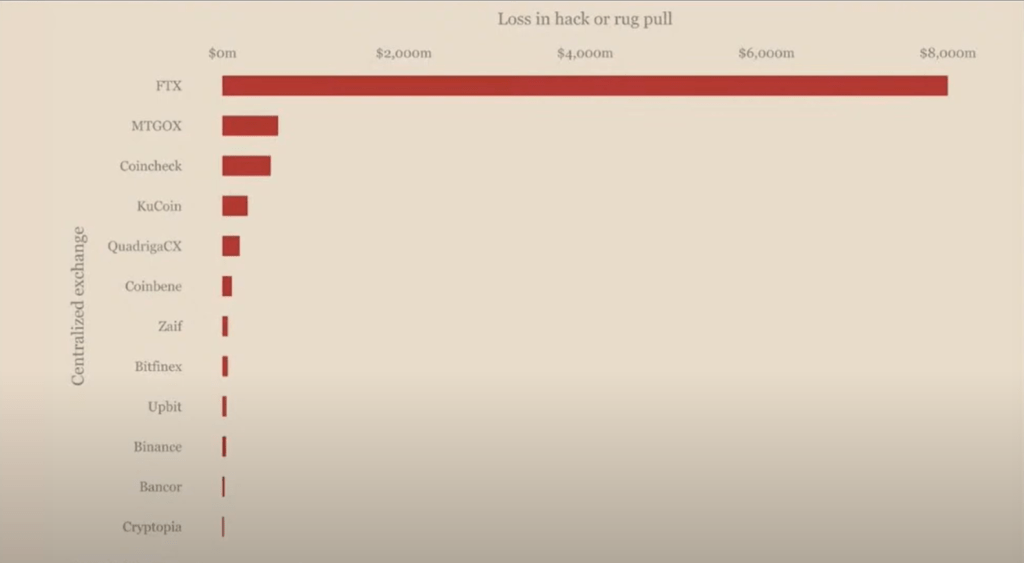In this short article, I'll unpack the mess of FTX in a few bullet points, run you through the principal-agent problem and walk through some of the lessons learned and what I see as the next steps in the crypto economy.
A lot has already been said / written about FTX, so I'll just quickly summarise it for those of you who didn't have time to read up on the events.
TL;DR (too long didn't read) summary of FTX bankruptcy
- Customers deposited crypto and fiat currency with FTX.
- FTX used customer deposits in several ways:
- 1) Investments of ~$2B in other crypto and non-crypto companies.
- 2) Loans of ~$10B to its own subsidiary hedge-fund trading company (e.g., Alameda Research) which then lost an amount to be determined.
- 3) Gave ~$70 million dollars towards political lobbying donations and spent tens of millions on Bahamas housing / offices.
- FTX also issued its own token (FTT) and used it as collateral for additional loans.
- Market prices fall due to macro conditions, assets of FTX including billions of dollars of the FTT token are wiped out.
- Coindesk report is leaked pointing out that FTX's liabilities exceed assets.
- Binance (major exchange competitor) announces that it will sell $500m of the FTT token to protect its customers.
- Panic ensues via bank run and within a week FTX declares bankruptcy, owing creditors (including customers) >$3B
There's obviously a lot more detail to unpack there, but that's what happened in a nutshell. Moving on from FTX, nothing has fundamentally changed technologically. Blockchain represents a significant innovation that is spreading across industries. Payments can now be made at a fraction of the cost of today's banking system without the need for a trusted intermediary; distributed accounting ledgers can be maintained with no single point of failure and; digital property rights can be verified on-chain. Crypto skeptics nonetheless will be having an absolute field day and enjoying some longed for schadenfreude.

The Principal-Agent Problem
This is not the first time a bankruptcy has occurred in this industry, nor will it likely be the last. Below is a list of just some of the instances where crypto companies have gone bust, been hacked or rug-pulled on investors' deposits:

What's unsettling is the fact that investors and in most cases, the unsuspecting retail public, are the one's who ultimately fall into these traps again and again. Specifically, it happens when trust is placed in an individual or group of individuals (company) to act in their best interest. Unfortunately, individuals can be greedy, immoral, incompetent and just down right corrupt. A more subtle explanation is what's known as the principal-agent problem. You can read about this in more detail in Nicholas Taleb's books: Skin In The Game and Anti-fragile. When two groups of people have different incentives, you can expect different actions and outcomes. Charlie Munger is also famous for the expression: "Show me the incentives and I'll show you the outcome". So how does this apply to not only FTX, but across industries?
When a customer deposits 1 bitcoin in a centralised crypto exchange, they trust that the company will safeguard it - naturally. In some cases that is true, but in other cases exchanges are fighting to offer the highest interest to depositors or trying to increase profitability for themselves and shareholders. That profit is earned through investing and taking risk. Luckily for the CEOs of these companies, it's not their life savings the risk is going to be taken on, it's your deposits. Alas, the principle agent problem. It's generally unavoidable that different groups will have different incentives, but it does lead to the main reason Satoshi invented bitcoin in the first place which I'll cover next.
Lessons learned and pathway forward
"I’ve been working on a new electronic cash system that’s fully peer-to-peer, with no trusted third party”
- Satoshi Nakamoto, Oct 31st 2008.
Lesson 1 - Understand self-custody: To move forwards, sometimes we have to take a step back. The initial cypherpunk ethos was to bring property rights to the individual through cryptography. Satoshi's bitcoin breakthrough means that you don't have to trust an exchange, a bank or any third-party to custody your bitcoin or any other crypto asset for that matter. You just need to trust yourself and your ability to safeguard your private keys.
The reality is, many people will be scarred from recent events and never come back to crypto, others will take to heart the importance of self-custody, and others will continue to make the same mistakes. I'm not advocating for a world where self-custody is the only option either. Alzheimer's disease, or sudden death scenarios means we may always need to trust others to some extent. However, we should take great measures to educate ourselves on how we can become sovereign individuals and self-custody securely. If you'd like to learn more on how to do this, Coin Bureau has an excellent video you can watch here.
Lesson 2 - More regulation is still needed: Going forward, I think what's clear is that more regulation is needed (and has been asked for for a long time). The ability for any company be it crypto or otherwise to speculate on investor deposits without explicit consent should be illegal. In traditional finance, lending out customer deposits is standard practice, known as 'fractional reserve banking' or having specific capital requirements based on assets held. Central banks have often backstopped bankruptcies and guarantee customer deposits as they can simply create more money. But ultimately, everyone still loses purchasing power through inflation. Which brings us back to why bitcoin exists. Finite, decentralised, sound money.
Lesson 3 - Education and De-Fi will be key: Education and understanding appears to be the only long-term solution, until investors and depositors truly know what they're getting themselves into, we're unfortunately going to repeat the same mistakes again and again. There's more possibilities on the horizon, specifically in the de-fi space that can help solve some of these centralised intermediary problems - but that's for another article.
Education = Freedom.
.png)
.png)